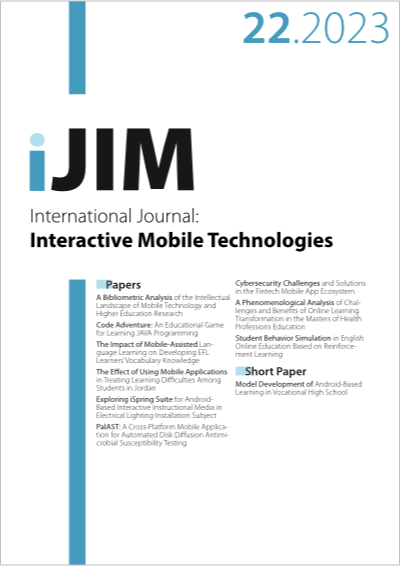The Impact of Mobile-Assisted Language Learning on Developing EFL Learners’ Vocabulary Knowledge
DOI:
https://doi.org/10.3991/ijim.v17i22.41665Keywords:
experimental study, Flashcard World Application, Pedagogical role, Moroccan secondary school students, Vocabulary knowledge improvementAbstract
Currently, a great variety of educational apps have been developed and extensively used by learners and instructors, making, as a result, mobile-assisted language learning one of the most prominent learning methods in enhancing the quality of language learning. However, despite the growing popularity of commonly used apps supporting second language acquisition, such as Kahoot and Quizlet, empirical research on the pedagogical role of other more recent applications in boosting L2 vocabulary is still scarce. Given this, this experimental study examines the effectiveness of a mobile application in enhancing Moroccan EFL secondary school students’ vocabulary knowledge. The study consisted of the control group (n = 30) and the experimental group (n = 30). While participants in the first group received traditional methods of teaching vocabulary, the experimental group integrated a mobile application (Flashcards World) during one semester. Data collection comprised vocabulary pre- and post-tests to compare the vocabulary learning of participants in both groups. To determine if there was a difference in the scores of the groups before and after the intervention, the findings were analysed using Independent-Samples T Tests (SPSS-26). The results revealed that the experimental group outscored the control group. Therefore, it was concluded that using Flashcard World application effectively improved vocabulary learning of secondary school students more than conventional teaching.
Downloads
Published
How to Cite
Issue
Section
License
Copyright (c) 2023 Hassane Benlaghrissi, Dr.

This work is licensed under a Creative Commons Attribution 4.0 International License.



